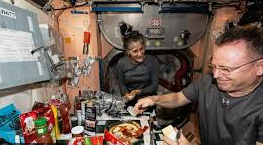Astronaut Sunita Williams holds a special place for being of women of Indian origin. It gives goosebumps to everyone in India for her endeavor to space in this age. In the vast expanse of space, where astronauts float weightlessly, a concerning health issue is taking center stage. Veteran astronaut Sunita Williams, known for her remarkable adaptability to space conditions, is now facing significant health challenges during her extended stay on the International Space Station (ISS).
The Unexpected Weight Loss Crisis
Williams, who has lovingly referred to space as her "second home," began her mission at a healthy 140 pounds. However, recent reports from NASA officials have raised alarms about her noticeable weight loss, with observers noting her visibly sunken cheeks. This situation highlights a broader concern: the unique challenges female astronauts face in maintaining their health during extended space missions.
Why Female Astronauts Are More Vulnerable
Research has revealed a troubling pattern: female astronauts experience muscle loss at a faster rate than their male counterparts. This accelerated deterioration is attributed to several factors:
1. Metabolic Changes:
2. Caloric Requirements vs. Reality:
- Astronauts need to consume 3,500-4,000 calories daily just to maintain their weight
- The weightless environment affects appetite and eating habits
- Work schedules and space station duties can interfere with regular meal times
3. The Exercise Paradox:
- Mandatory two-hour daily workouts are essential to prevent bone and muscle loss
- These workouts burn additional calories, making weight maintenance even more challenging
- In zero gravity, the body works differently, requiring more energy for basic functions
The High-Altitude Factor
- Appetite regulation
- Nutrient absorption
- Overall metabolic function
NASA's Response and Intervention
Looking Forward: Solutions and Recommendations
1. Personalized Nutrition Plans:
- Higher calorie-dense foods
- Customized meal schedules
- Supplements designed for female astronauts
2. Modified Exercise Protocols:
- Balanced workouts that maintain strength while managing caloric burn
- Targeted exercises for female-specific muscle preservation
3. Enhanced Health Monitoring:
- Regular body composition assessments
- Metabolic tracking
- Adjustment of dietary and exercise plans based on individual response
The Broader Implications
- This situation highlights the need for:
- More gender-specific research in space medicine
- Development of specialized nutrition programs for female astronauts
- Advanced monitoring systems for long-duration space missions
